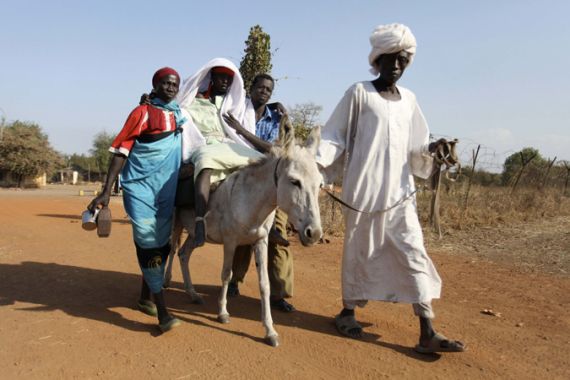What is behind the tribal violence in Sudan’s Blue Nile State?
Clashes between two tribes have killed at least 79 people, wounded 150 others and left dozens of shops torched.

Dozens of families are fleeing violence in Sudan’s Blue Nile State, where continuing clashes between two tribes have killed at least 79 people, according to the state’s security committee and other officials.
At least 150 others have been wounded and dozens of shops were torched in the town of al-Roseires since the violence broke out in the past week over a land dispute between the Birta and Hausa tribes.
While members of the Hausa tribe say the violence erupted after the Birta rejected a Hausa request to create a “civil authority to supervise access to land”, Birta tribesmen said the tribe was responding to a “violation” of its lands by the Hausa.
What is behind the violence?
- According to Blue Nile Governor Ahmed al-Omda, the issue began “two months ago when the Hausa demanded that they be included in the [Blue Nile’s] regional administration,” he said in an interview on Sudan TV on Saturday.
- The conflict escalated after the Hausa tribe chose a leader to represent and manage the tribe’s affairs – a move that was rejected by the tribal administration in the region.
- On July 10, Hausa farmers clashed with Birta shepherds near the city of Qaisan along the Sudanese-Ethiopian border. Two people were killed in the clashes.
- Four days later, the clashes reached Qaisan itself. At least 13 people were killed, according to the regional government.
- Activist Muhammad Hussein Musa, who lives in al-Roseires, dates the issue back to January, when members of the Hausa tribe held a celebration of their independence as an emirate, while leaders of several tribes, including the Birta and the Funj, demanded the abolition of the Hausa emirate.
- Ibrahim Hussein, a 56-year-old member of the Hausa tribe, said: “I was born in Wad al-Mahi. So was my father. How can this not be my land? Where do I go? I am a Sudanese citizen, and these are my rights.”
- Rejecting the Hausa’s claim, the head of the Blue Nile’s tribal administration, El-Obaid Hamad Abu Shotal, said: “This [area] belongs to the tribes of the Blue Nile, and you are our guest. How can you demand to be part of the native administration?”

What are the roots to the conflict?
- The Blue Nile state, and the wider region in general, have long seen unrest, with southern fighters a thorn in the side of Sudan’s former strongman president Omar al-Bashir, who was deposed by the army in 2019 following street protests.
- Experts say last year’s coup, led by army chief Abdel Fattah al-Burhan, created a security vacuum that has fostered a resurgence in tribal violence, in a country where deadly clashes regularly erupt over land, livestock, access to water and grazing.
- Pro-democracy demonstrators accuse Sudan’s military leadership and ex-rebel leaders who signed a 2020 peace deal of exacerbating ethnic tensions in Blue Nile state for personal gain.
- In 1995, many tribes in the Blue Nile region joined a popular movement fighting the central government in Khartoum. They perceived the governor appointed by the central government as close to the Hausa tribe.
- Sudanese activist Muhammad Hussein said that the former government continued to favour the Hausa tribe because it believed the others supported the anti-government movement.
- But Hausa tribesman, Ibrahim Hussein, rejected the claim, saying that members of the Hausa tribe were on both sides of the conflict.
- The Sudanese Hausa tribe are part of the much larger Hausa ethnic group, which is particularly prominent in West Africa. It is unclear when members arrived in Sudan, but some local tribes still perceive them as outsiders.
Where is the conflict heading?
- Raising fears that the situation will become more violent, military expert, Major-General Amin Ismail said: “The conflict in the Blue Nile will become more bloody, especially as politicians become involved in the tribal conflict.”
- Ismail warned: “If security breaks down in the Blue Nile region, it will become a theatre for the movement of groups opposing the Ethiopian government.”
- Observers fear the conflict will spill over into the Ethiopian Benishangul-Gumuz region, where Addis Ababa is building the Renaissance Dam.
- The Birta tribe lives on both sides of the Sudan-Ethiopia border, while the Hausa tribe has a presence in a few villages and cities along the border.